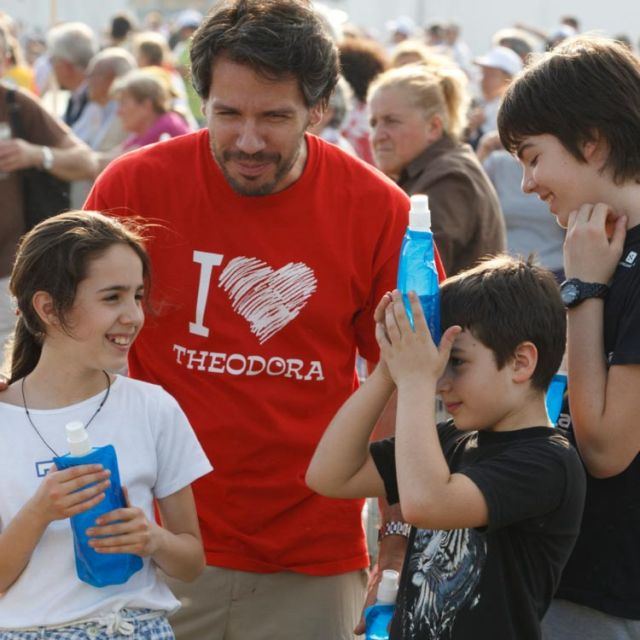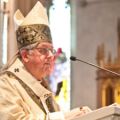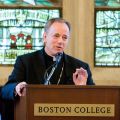NEWS
Canadian census figures show 'devastating' decline in traditional family
By Deborah Gyapong, Canadian Catholic NewsOTTAWA - Canada's latest census figures showing a continued decline in married-couple families and a hefty rise in lone-parent and common-law arrangements are “sad and worrisome” and “nothing to celebrate,” say pro-family organizations.
Peter Murphy, assistant director of the Catholic Organization for Life and Family (COLF), said the “handwriting is on the wall” as the 2011 census reveals the number of common-law couples has risen 13.9 per cent since 2006 and lone-parent families have increased by eight per cent. The number of children living with married parents declined from 68.4 per cent to 63.6 per cent from 2006 to 2011, Statistics Canada reported in a Sept. 19 release of data on family structures. But when the figures are examined over 50 years, the picture shows a dramatic decline from around 90 per cent of married couple families in 1961. A steep decline began in the mid-1970s.
“Despite an attempt by the media to make ‘diversity’ in family structure seem like a good in itself, when it comes to questions pertaining to procreation and child-rearing the ‘writing’ is inscribed on the human body,” Murphy said in an e-mail interview. “It takes a man and a woman to conceive a child and, as the social sciences have told us repeatedly, it is in the best interest of children to be raised by a man and a woman united in marriage.
“Study after study has found that the advantaged child is the one raised by one woman and one man in a stable, committed relationship,” he said. “This is because God, our creator, has made the union of man and woman fruitful and this fruitfulness is not limited to physical procreation.”
The Institute of Marriage and Family Canada (IMFC) warned the family related data outlines an “alarming trend” that will lead to greater child poverty. IMFC research and communications manager Andrea Mrozek said she was disturbed by the “chirpy” response to the troubling data in the mainstream news media.
Mrozek said the IMFC has shown in its research that family breakdown is linked to poverty — citing the 2006 census which showed 8.2 per cent of married couples were in poverty, according to the Low Income Cut Off (LICO), compared with 16 per cent of lone-parent families headed by men and 32.2 per cent of lone-parent families headed by women.
The media seemed to be applauding the growth of more diverse, progressive family circumstances, she said. The coverage was “superficial” and misses the real story of demographic and family decline that is “devastating” for Canada as a country and for every individual touched by family breakdown, said Mrozek.
Most social science research in the United States has acknowledged that the married couple raising children biologically related to them is the best for children on a range of outcomes from poverty levels to drug or alcohol abuse, trouble with the law, mental health, early sexual activity and future success at maintaining stable marriages themselves, Mrozek points out. This message has not reached most policy advisors in Canada.
COLF agrees the research shows married-couple families raising children biologically related to them have the best outcomes.
“The social cost of equating ‘alternative’ parenting relationships with the traditional family has already had a profoundly negative impact on society,” Murphy said. “To begin with, children raised in non-traditional family structures are statistically more vulnerable to abuse and to developmental and social problems of various kinds. Both the children themselves and society in general end up paying a high price.”
Like Mrozek, Murphy shares concerns Canada’s aging population and dwindling number of working taxpayers make the cost of family breakdown “increasingly difficult to bear.”
“Not surprisingly, in such circumstances, some are already pushing for euthanasia,” he said. “If we are serious about wanting to forestall further societal damage, we need to embrace God’s vision for human sexuality and the human family — the vision so beautifully articulated by Blessed John Paul II in his Theology of the Body.
“Healthy families make for healthy citizens,” he said. “At every level of society, we need to make support for the traditional family a priority.”
Vatican synod to examine when divided Christians can preach together
By Cindy Wooden, Catholic News ServiceVATICAN CITY - The potential power, but also the limits, of an ecumenical proclamation of the Gospel and defense of Gospel values is likely to be a key topic during October's world Synod of Bishops on the new evangelization.
The ecumenical focus will be particularly sharp Oct. 10 when — at the personal invitation of Pope Benedict XVI — Anglican Archbishop Rowan Williams of Canterbury will deliver a major address to synod members.
While popes have long invited other Christians to be "fraternal delegates" and make brief speeches at the synods, Pope Benedict has begun a tradition of inviting important religious leaders to deliver a major address. In 2008, Orthodox Ecumenical Patriarch Bartholomew of Constantinople and Chief Rabbi Shear-Yashuv Cohen of Haifa, Israel, addressed the Synod of Bishops on the Bible. Another rabbi and two Muslim leaders gave speeches at the 2010 special synod on the Middle East.
Bishop Brian Farrell, secretary of the Pontifical Council for Promoting Christian Unity, said the invitations demonstrate the Pope's recognition that the "challenges facing religious belief itself and Church life are common — no Church, no religion is an island — and we need one another and can learn from one another."
In addition, he said, ecumenical and interreligious co-operation shows the world that "we are together in promoting the values of belief and the moral-ethical values that we stand by."
Ecumenical co-operation is crucial when trying to transmit the faith in the modern world and to re-propose Christianity in areas, especially Europe and North America, which had a Christian tradition, but are becoming increasingly secularized.
"The mission that the Lord entrusted to the Apostles, to preach the Gospel to the ends of the Earth, has not been fulfilled — mostly because of divisions among His followers," Farrell said.
The beginnings of the modern ecumenical movement usually are traced to a 1910 conference of missionaries "who had the experience of being seen as preaching against each other instead of preaching Christ," he said. The missionaries recognized the scandal they were causing as they "exported their divisions" to Asia, Africa and other parts of the world.
The missionaries saw "their work being undermined by their own divisions," which they increasingly acknowledged were violations of the will of Jesus that His followers be one, the bishop said.
Meanwhile, among some Catholics in the early 1900s, "there were the beginnings of a spiritual interest in the idea of prayer for Christian unity," he said, but the quantum leap in the Catholic Church's commitment to ecumenism came with the 1962-65 Second Vatican Council.
Farrell said the change in the Church's attitude reflected an "education of the bishops at the council, because most of the bishops came with the kind of theology that considered our Protestant brothers and sisters, and the Orthodox to a certain degree, as just outside the Church."
Through discussions and studies at the council, he said, the bishops gained "a new perspective: We have a common faith in Jesus Christ, we have a common baptism, and this is already a huge element of real communion in the faith."
The ecumenical task, embraced by the Catholic Church, involves prayer and dialogue to move that communion "from imperfect to perfect," he said. Until the process is complete, however, there will be some limits to the possibilities for ecumenical co-operation in evangelization, because Catholics, Orthodox, Anglicans and other mainline Christians aren't just inviting people to profess faith in Jesus Christ, but to live that faith in His body, the Church.
"There is a kind of superficial ecumenism that says, 'it doesn't matter what Church you belong to,'" Farrell said, but the Catholic Church and most of its dialogue partners reject that view.
Because Christians aren't passing on "some Gospel of their own making," but a faith they have received, "sharing one's faith means sharing one's belonging to a particular community that has given me that faith. It means sharing the conviction, in conscience, that the Gospel comes to me in its fullness in this particular community," the bishop said.
The role of the Church and, in fact, the definition of what it means to be fully Church is at the heart of the ongoing, sometimes difficult, theological ecumenical dialogues, he said.
For the Catholic Church, Farrell said, "We can't work for a common minimum denominator; nor can we say, 'let's keep our differences and just accept one another as we are.'
"We have to aim at whatever is required for the fullness of incorporation into Christ and into the one Church He founded. But where is that Church? That is the question that will trouble us until Christian disunity becomes Christian unity: not uniformity, but true, grace-filled communion in faith and Christian living."
Third volume of Pope's Jesus of Nazareth expected by Christmas
By Catholic News ServiceVATICAN CITY - The third volume of Pope Benedict XVI's book on Jesus of Nazareth should be published before Christmas, the Vatican said.
The volume, focusing on the Gospel accounts of Jesus' infancy and childhood, will be the third and final volume in the series of books the Pope has written "to make known the figure and message of Jesus," the Vatican said in a statement Sept. 21.
The statement announced a Vatican publishing house agreement with the Italian publisher Rizzoli to handle sales of the rights to the book in languages other than Italian and the German original. Herder, the Pope's longtime German publisher, will handle the original German-language text.
The Vatican's plan is to release the book simultaneously in the world's major languages, including English, in time for Christmas.
The first volume of Jesus of Nazareth, covering the period from Jesus' baptism to His Transfiguration, was published in 2007. The second volume, looking at His passion and death, came out in 2011.
Cardinal Collins to open Year of Faith in Toronto
By Michael Swan, The Catholic RegisterTORONTO - From your library to the confessional, from relics to rejoicing, the archdiocese of Toronto has lined up a year’s worth of ways to rediscover faith.
The Year of Faith kicks off inter- nationally on Oct. 11, commemorating the 50th anniversary of the opening of the Second Vatican Council. In Toronto, the year will start with a solemn opening Mass with Cardinal Thomas Collins at St. Paul’s Basilica on Oct. 14. All 223 parishes in the archdiocese are being encouraged to send representatives, particularly their RCIA catechists, youth leaders and parish council members, to the 4 p.m. Mass at the downtown basilica.
Collins will also dedicate this year of lectio divina programs to a biblical understanding of faith.
The Office of Formation for Discipleship wants to add the Catechism of the Catholic Church to your reading list. And they hope to introduce young people to the Compendium of the Social Doctrine of the Church and the YouCat youth catechism produced for World Youth Day in Madrid in 2011.
“Exploring the Catechism: Faith Alive!” is an eight-part series, and the catechism-based six-part series “Basic Teachings of the Catholic Church” will be promoted in parishes by the Office of Formation for Discipleship. A Fr. Robert Barron 10-part video series called Catholicism will also be available.
The Office of Catholic Youth will run catechetical events based on the Compendium of the Social Doctrine of the Church and YouCat.
A chance to visit with martyrs and saints will be coming to many parishes. Relics of 17th-century Jesuit martyrs from the Martyrs’ Shrine in Midland, Ont., and of St. Br. André Bessette from St. Joseph’s Oratory in Montreal, will tour the archdiocese.
On Oct. 21 seven blesseds will become saints, including Blessed Kateri Tekakwitha, the Lily of the Mohawks. The canonizations will happen in Rome. Parishes are being encouraged to organize events to celebrate Canada’s first aboriginal saint.
Penance will lead local Catholics to faith with the all-day confessions event called “Return to Me With All Your Heart.” The program will be offered in many parishes during Lent.
“The renewal of the Church is also achieved through the witness offered by the lives of believers,” Pope Benedict XVI wrote in his October 2011 announcement of the Year of Faith, Porta Fidei. “By their very existence in the world, Christians are called to radiate the word of truth that the Lord Jesus has left us.”
St. Raymond's gets an Olympic thrill with soccer star Melanie Booth
By Evan Boudreau, The Catholic RegisterTORONTO - Students at St. Raymond's Catholic School got a taste of Olympic glory on Thursday morning when bronze medallist Melanie Booth paid a visit to the Toronto school.
Booth, a defender on the pitch, was a member of Canada's national women's soccer team that captured the hearts of Canadians when the squad captured bronze in London this summer. The Burlington, Ont., native has also been a member of the silver-medal winning team at the FIFA U-19 Women's World Championship in 2002, finished second at the 2006 Peace Queen Cup and took home gold at the 2011 Pan-American women's soccer tournament all while donning the maple leaf.
Booth was thrilled to share her medal with the St. Raymond's students.
"It's probably one of my favourite things about this Olympic medal, being able to share it and to just see the joy and excitement that everybody has when they do see it," said Booth. "Still I think I'd rather be out on the field than talking to people."
Nervous as she is about public speaking, Booth gave one message she feels young students need to hear — even if it means sweating in the spotlight for a little bit longer.
"Just never give up. You're going to have to many roadblocks in the way, people telling you you can't do things, injuries, other things that will hold you back. But if you really believe in yourself and you really want to go for your dream just never give up."
"I'm excited to have her here because she represented our country in the Olympics and I really like soccer," said Vanessa Ferreira, 10. "It teaches you that you can do anything. It's hard to go inside the Olympics but if you try hard you can do anything."
Along with fellow Grade 6 student Debbie Dias, Ferreira was selected to write and read a letter of thanks to Booth for taking the time to stop by their school.
"We were chosen to represent our school by saying thank you to somebody who is representing our country and who is a great athlete," said Ferreira. "It's an honour."
St. Raymond's was one of 10 schools from across the Toronto Catholic District School Board selected to host an Olympian or Paralympian on Sept. 20. It was part of a three-day celebration, from Ottawa to Toronto, for many of the athletes who represented Canada at the London Olympics. The three days included a trip to Parliament Hill, school and hospital visits and was to be capped off with a parade through downtown Toronto on Friday and a public celebration of the Olympians.
"It's such an honour and especially after watching the news yesterday and seeing how the Prime Minister also acknowledged their wonderful gifts of sportsmanship to Canada," said Anne Marie Verre, St. Raymond's principal. "To see a female soccer hero coming is a wonderful role model especially for my young girls, but also for the boys of course."
Finding out their guest's identity just 24 hours earlier left little time for Verre and the students to prepare, although you'd never have guested it walking into the gymnasium.
"We immediately went onto the Internet and searched Melanie Booth and some exciting facts about her ... and we posted it throughout the school so the children realized that this person is actually coming here," said Verre. "So the children could (then) get an idea of who she was simply by walking through the halls."
This preparation, short as it may have been, gave the students at St. Raymond's the ammunition they needed to bombard Booth with questions, autograph requests and photo shoots — excitement she enjoys almost as much as being on the field.
CCAS funds dreams and ambitions for former foster kids
By Michael Swan, The Catholic RegisterTORONTO - When 21-year-old Tia McGregor sees the younger kids who like her have grown up in foster homes — kids who have to figure out life without a family to support them the day they turn 18 — she tells them to follow their highest ambitions and their most cherished dreams.
"Do what you love and the rest will follow," she says.
The fourth-year Queen's University drama student knows her message is pretty hard to take seriously when you're 18 and have just been kicked out of your foster home.
"It didn't help me when people told me," she said. "For youth in care, there is so much more you have to think about."
Most former foster kids think they can't afford ideals, dreams and ambitions, said McGregor. They've got to worry about the rent, groceries, tuition. They've got to walk the tight-wire of daily life without the safety net of a family.
McGregor attended her third annual Hope For Children Foundation awards dinner Sept. 19 at Hart House on the University of Toronto campus. She collected a $2,000 scholarship to help with another year of post-secondary education. In total, the Hope For Children Foundation gave out $140,000 this year in scholarships to Catholic youth who had been through the foster care system with Catholic Children's Aid Society of Toronto.
One-hundred-six young people collected scholarships this year in amounts of $1,500 for community college students and $2,000 for university students.
For these kids the scholarships are a very small part of their financial picture, said Catholic Children's Aid executive director Mary McConville.
"We wish it was more," she said.
Statistics Canada released a study Sept. 12 showing the average Ontario undergraduate pays $7,180 in tuition fees alone. Since 2006 Ontario tuition fees have increased by a cumulative 71 per cent, said the Canadian Federation of Students — Ontario. Add in modest living costs, books, transportation and the real cost of an academic year is more like $11,000, according to the Hope for Children Foundation.
But still, the high-achieving McGregor urges idealism and big dreams on younger foster students. A high school math and science whiz, McGregor began university in astrophysics, trying to pursue the safe science career people expected of her. She wanted to study a little theatre on the side, but chemistry got in the way of a drama minor.
"In the end, I couldn't lie to myself," she said.
She switched programs despite the expectations of her foster family and former high school teachers, because the alternative to following a dream is grim and lifeless. She's blossomed as a writer, comedian and actress and spent last summer with the Thousand Island Playhouse summer theatre program acting and leading writing workshops for high school students.
None of this success was built into McGregor's beginnings. Her mother discovered she was pregnant at 15, and because the father was black the family rejected their daughter and granddaughter. McGregor's mother developed a drug addiction and her father was mostly absent. At six McGregor took refuge at her best friend's house every day and then every night.
Eventually that best friend became McGregor's foster sister and by the time she was eight the neighbour family officially became her foster home. Soon afterwards, McGregor's foster family moved from Scarborough two-and-a-half hours' drive east to Campbellford, Ont.
Small-town life was stable, warm, accepting — all she could have asked for. Unlike many foster children, McGregor stayed in the same home until she went away to university.
But she never had to look far to see how much more difficult things could have been. One of her foster sisters turned 18 last year before graduating from high school. Under Ontario law foster children are no longer crown wards at 18 and must immediately move out. McGregor's foster sister found a place with a school friend 45-minute's drive from her school. The 18-year-old managed to finished high school despite the dramatic dislocation and is now attending college.
McGregor believes the things she's experienced and seen in her life as a foster child have done more than toughen her up for life. They've also made her a better writer.
"I have more life experience, maybe," she said. "And that makes for a good writer."
Refugee groups want bishops to grill Kenney
By Michael Swan, The Catholic RegisterTORONTO - When Immigration Minister Jason Kenney walks into a room full of bishops in St. Adéle, Que., Catholic refugee agencies are hoping the minister gets an earful.
Five Catholic immigration and refugee organizations in Toronto have written to the bishops asking that they challenge the minister on changes to Canada’s refugee and immigration laws. Kenney will address the bishops between Sept. 24 and 28 in a private, off-the-record session at the Canadian Conference of Catholic Bishops’ annual plenary meeting.
Romero House, Sanctuary Ministries of Toronto, FCJ Refugee Centre, The Mustard Seed and Becoming Neighbours want the bishops to ask Kenney:
o Why Canada is treating refugees from some countries differently than refugees from other countries?
o Whether it’s fair to rush certain cases through the system before refugees hire a lawyer and prepare a thorough case?
o Why the government is limiting basic health care for refugees?
o Why do so many of Canada’s 200,000 foreign workers have no stable pathway to permanent resident status?
o Why are refugees smuggled into Canada as a group blocked for five years from re-uniting with their families even if they are found to be legitimate refugees?
The CCCB won’t say whether these questions will be asked, but it has the potential to re-open an old feud between the bishops and Kenney. In November 2010 the bishops’ Justice and Peace Commission wrote to Kenney to complain of sections of “The Balanced Refugee Reform Act and the Maritime Transportation Security Act.”
“Many of the clauses of this legislation may contravene international law and Canadian law, and penalize refugees more than the smugglers,” said the CCCB letter, adding that his anti-smuggling bill “risks creating serious obstacles to sponsorship and family reunification.”
Kenney did not welcome the bishops’ criticism, telling Canadian Catholic News Ottawa correspondent Deborah Gyapong the letter reflected a “long tradition of ideological bureaucrats who work for the bishops’ conference producing political letters signed by pastors who may not have specialized knowledge in certain areas of policy.”
Romero House director Sarah Villiger hopes this approach to Kenney through the bishops will draw a warmer response.
“We knew that (Kenney) would be there, personally invited. I think that in itself is a bit of a different tone, as opposed to just writing him a letter,” she said.
In part, the refugee agencies wanted to remind the bishops of their own stand on refugee and immigration issues. The letter quotes the bishops own 2006 pastoral letter “We Are Aliens and Transients Before the Lord, Our God.”
“Openness should be shown to persons of all cultures and origins, no matter their immigration status. Christians are to be among those who refuse to let injustice toward migrants continue, let alone increase,” the bishops wrote.
“We thought it was important that they get the input of people who work on the ground with refugees,” said Villiger.
The organizations also took the opportunity to remind the bishops of the many refugees and immigrants who actually occupy pews on Sunday morning.
“The Canadian Catholic Church has historically been an immigrant Church, and today many of the Catholic faithful are immigrants and refugees who form a vital part of and make a significant contribution to the Church in Canada,” they wrote.
Papyrus fragment with reference to Jesus' 'wife' stirs debate
By Carol Glatz, Catholic News ServiceROME - Scholars are unlikely to agree any time soon on the authenticity of a newly published text containing a reference to Jesus' "wife."
But the tiny papyrus fragment, purportedly dating to the fourth century., has already stirred interest in the early Church's attitudes toward marriage, sex and the role of women.
The fragment of papyrus with eight lines of Egyptian Coptic writing is the "only extant ancient text which explicitly portrays Jesus as referring to a wife," wrote Karen L. King, historian of Christianity at Harvard Divinity School, in an academic paper she delivered Sept. 18 at an international Coptic studies conference in Rome.
"It does not, however, provide evidence that the historical Jesus was married," she wrote, "given the late date of the fragment and the probable date of original composition" at the end of the second century.
The best source of evidence giving an account of Jesus' life and ministry is still the Gospels in the New Testament, King told reporters the next day, "and they are silent about His marital status." But she said the fragment is "direct evidence" that early Christians started debating in the second century whether Jesus could have been married or not.
Fr. Juan Chapa, a New Testament scholar at the University of Navarra in Spain, told Catholic News Service that the "Gospels don't mention marriage, not because they wanted to hide something, but because it was clear that Jesus did not get married, and it's consistent in the Church's tradition." He also noted that the gnostic gospel genre to which the fragment evidently belongs is one of stories about Jesus that mainly take place after the Resurrection, using language that is heavily allegorical. Thus, he said, the fragment's relevant words —"Jesus said to them, 'My wife' ” — were likely not meant as a literal assertion about the life of the historical Jesus.
King said that the significance of the fragment lies in the light it might shed on debates in the early Church over the necessity of celibacy to living a holy life.
According to Michael Peppard, a professor of theology and Coptic language at Fordham University, a belief in asceticism saw rapid development in the second to fourth centuries, especially in Egypt where Christian monasticism was born. Some bishops at the time "were saying that the highest ideal was asceticism," which included renouncing "all the trappings and worries of material life," including marriage. But Peppard said other bishops in the same period "were figuring out how to give everyone their space," and letting it be known it was all right for Christians to live in the world.
The new text published by King may be a sign of early Christians "pushing back" against asceticism and moving closer to mainstream Jewish attitudes "of blessing sex and procreation," Peppard said.
Catholic teaching, Chapa said, holds that "Jesus' celibacy, by differentiating Him from other rabbis, underlines His unique mission to fulfill the kingdom of God, and shows how He embodied the love of God" by renouncing conjugal love.
King said the reference to Jesus' wife could just be a symbol of the Church, akin to the Gospel allegory of Jesus as bridegroom of the Church.
"What if what's missing is saying, 'My wife is the Church?' ” King said.
But both Peppard and King argue that the word does refer to a real person, since the line just below it includes the words: "...she will be able to be my disciple..."
The "wife" in question could be a "spiritual wife," Peppard said. Other texts from the same period uphold "the image of an unconsummated spiritual marriage where the best kind of husband and wife live celibately," he said.
King acknowledged that there would be continued debate over the authenticity of the fragment, whose paper trail goes back only to the 1980s.
"I would say it's a forgery," Alin Suciu, a papyrologist at the University of Hamburg who was attending the conference with King, told the Associated Press. "The script doesn't look authentic" compared to other fourth-century Coptic papyri.
But Roger Bagnall, a papyrologist and director of the Institute for the Study of the Ancient World at New York University, studied the handwriting, the grammar and how the ink was absorbed by the plant fibres, and concluded it was likely to date from the period between 350 and 400.
"We can't ever know or be 100-per-cent sure if it's authentic or a forgery," Peppard said.
King said any properly accredited scholar in the world is welcome to study the papyrus, and that criticism of her findings is part and parcel of any historical study.
"We want to do the best job we can with new historical data," she said.
Chapa called King's discovery "exciting," and nothing for believing Catholics to fear.
"Anything that helps us understand our past, to understand the history of the Church and how the Church defined herself in history," he said, "is very valuable and positive."
Bosnia's Catholic leaders say real dialogue impeded by injustices
By Jonathan Luxmoore, Catholic News ServiceCatholic leaders in Bosnia-Herzegovina said real ethnic and religious dialogue is not occurring and not all religions have equal rights.
"Real dialogue" is being impeded by "legalized war crimes and injustices," as well as by failure to implement the peace accord that ended the country's 1992-95 war, said Msgr. Ivo Tomasevic, secretary-general of Bosnian bishops' conference.
Tomasevic welcomed a September interfaith peace appeal, issued in Sarajevo after an international peace meeting sponsored by the Rome-based Sant'Egidio Community gathered 2,000 Catholic, Orthodox, Protestant, Muslim, Jewish, Buddhist and Hindu representatives.
However, in a Sept. 19 interview with Catholic News Service, he said the country still lacks a firm foundation for religious and ethnic co-existence.
"Peace is firstly a gift from God, so it's important all faiths and confessions pray for it together," he said. "But we also need to work for peace, at a time when our Catholic population has almost halved and the Catholic presence in Sarajevo is dwindling year by year."
Tomasevic said participants had expressed a wish to create a zone of peace in Bosnia-Herzegovina, where more than 100,000 people died in the war.
Earlier, the president of the Bosnian bishops' conference told the Croatian daily Vecernji List that he had questioned claims at the meeting that his country offered an example of religious and ethnic reconciliation.
"In no other European country has the plight of Catholics been as dramatic as here — at least half have left, and those who remain have problems finding a roof over their heads, food, jobs and conditions for life," Bosnian Bishop Franjo Komarica of Banja Luka said in the interview, published Sept. 16.
"I pointed this out many times during the meeting and was warned participants knew nothing about these things. I accepted this, although I don't know whether people are uninformed, or rather uninterested."
Bosnian newspapers said Bosnia's Grand Mufti Mustafa Ceric had rejected complaints by Catholic and Orthodox leaders at the meeting that growing Muslim domination had left Christians with no future in Sarajevo.
A statement issued by participants at the end of the Sept. 8-11 meeting said Bosnia was a reminder of hostilities caused by religious and ethnic differences, but also of the "grace of dialogue" and of "how to build the future."
"Religious and national communities in Sarajevo remind us war is a great evil and leaves a poisoned legacy," the statement said. "Although we are different, we unanimously believe different people can live together fruitfully anywhere in the world. This is possible in Sarajevo and elsewhere — we must prepare responsibly for the future."
Catholics made up 18 per cent of the 4.3 million citizens of Bosnia-Herzegovina, with Muslims and Orthodox Serbs constituting 44 per cent and 35 per cent, respectively, before the war, which ended with the formation of separate Serb and Croat-Muslim territories in a united country.
Tomasevic told CNS that religious leaders could not make the political decisions needed to create firmer foundations for peace, adding that he feared the meeting's final statement could be misused by local politicians.
"The peace meeting was all very well, but we still need a more-just society where the three constituent peoples will have equal rights," Tomasevic said.
"It's important we shape consciences so people will be open to dialogue and tolerant of differences. But injustices are occurring not just at the level of power, but in ordinary life as well. Until a better foundation is created, our personal goodness will not be enough."
Miller calms conflict within pro-life movement
By Deborah Gyapong, Canadian Catholic NewsThis article was amended on Sept. 24, 2012 to clarify comments made by Jim Hughes.
OTTAWA - A statement by Vancouver Archbishop Michael Miller that supports Catholics who campaign for “gestational legislation” to limit abortion has helped calm growing tensions within the pro-life movement.
Miller wrote it is “morally licit” for Catholics to support legislation that sets limits on abortion rather than immediately banning it outright. The archbishop’s statement, quickly endorsed by Toronto’s Cardinal Thomas Collins and posted on the Canadian Conference of Catholic Bishops’ (CCCB) web site, urges co-operation in the pro-life movement but stresses: “Co-operation does not always mean unanimity regarding a given strategy; open and civil debate about the wisdom of any specific strategy is healthy.”
Over the past year, support in pro-life circles across Canada has grown for a law that would prohibit abortion at later stages of pregnancy or gestation. Campaign Life Coalition, the national political arm of the movement, however, has remained staunchly opposed as have several other groups that believe incremental legislation of this type will not result in an eventual ban on abortion.
Each side has accused the other of not being Christian or Catholic enough — either for not protecting those babies that might be saved through some restrictions on abortion, or for not sending a strong enough message about the value of all human life from conception.
But Miller said that both positions, for or against gestational legislation, are morally licit.
Miller wrote it is acceptable to support gestational legislation (i.e. legislation that would allow abortion in the early weeks of the unborn child’s development) as an incremental step that would reduce the harms of “an unjust legal regime that permits abortion.” But such law should be regarded “as a step along the way to the eventual full legal protection of the right to life of all unborn human beings.”
“At the same time, it is also morally licit to withhold support for gestational legislation — and other incrementalist legislative strategies intended to limit access to abortion — if, after prudent reflection, one is convinced that it is an unwise legislative strategy,” he said.
The Catholic Organization for Life and Family (COLF), co-sponsored by the CCCB and the Supreme Council of the Knights of Columbus, welcomed Miller’s intervention.
“The division within the pro-life movement is very preoccupying, especially when leaders and members of pro-life groups point at each other and criticize each other’s approach to protecting the unborn,” said COLF director Michele Boulva. “All this hinders our chances of obtaining a law that would protect the most vulnerable of Canadians — its unborn citizens.”
She applauded the bishops’ taking leadership in the pro-life arena.
“As Catholics it is essential that we turn to our bishops when confusion arises regarding the Church’s teaching. Christ has empowered them to teach in His name.”
Based on Blessed John Paul II’s teachings in Evangelium Vitae, “legislation which intends to limit the harm done by a pro-abortion law is not itself co-operation with unjust law but rather ‘a legitimate and proper attempt to limit its evil aspects,’ ” the archbishop wrote.
The absence of any law restricting abortion in Canada is a “de facto legal regime that permits abortion with almost no restrictions,” the archbishop said.
“Legislation intended to restrict access to abortion would not create a new legal situation in Canada which would authorize abortions, but instead would intend to limit the number of abortions already authorized under law,” he said.
He also reiterated Catholic teaching against abortion at any stage, noting that “no law can claim to legitimize abortion.”
Two major pro-life groups on either side of the issue welcomed Miller’s statement.
Campaign Life president Jim Hughes said the archbishop makes it clear we have a de facto law by having no restrictions on abortion.
“I thought Archbishop Miller laid the case pretty well,” he said. "Although I and many others would not necessarily agree with his opinion on a de facto law.”
The most important part of his statement “points out that gestational legislation may or may not be the way to go,” said Hughes, who remains wary of the gestational legislation approach.
Priests for Life Canada is among the many pro-life groups that would support gestational legislation. Priests for Life board chairman Fr. John Lemire, a parish priest based in New Liskeard, Ont., said he is pleased the archbishop’s statement has “supported the idea that a Catholic, a Catholic politician, can in good conscience support gestational legislation.”
The archbishop’s letter may have helped shore up some of the unity within the pro-life movement that has been fragile since its inception, Hughes said. The movement is made up of political, educational and pastoral groups that counsel and support mothers with unexpected pregnancies.
“Campaign Life Coalition has been accused of being ‘all or nothing’ and that’s not true,” Lemire said, noting that since its first questionnaire in 1978, it has “always had an incremental question as part of its strategy.”
The key, said Hughes, is in the wording of any legislation.
“I’m not in favour of ‘we need any law,’ ” Hughes said.
He is opposed to the gestational approach because the experience of countries with gestational laws in place have “so many exceptions” the laws are “virtually useless.” There are many other forms of incremental legislation that would restrict abortion — such as defunding it, or informed consent laws, that Campaign Life would support, he said.
“As the political branch of the pro-life movement we have been battling over 30 years,” he said. Campaign Life has also worked closely with counterparts in other countries who have said “gestational limits are not the way to go.”
Hughes’ objection to gestational legislation extends beyond doctrinal concerns to practical matters, he said. Campaign Life has focused on identifying and supporting individual pro-life candidates in both the Conservative and Liberal parties at the grassroots level. He noted that there are presently 60 pro-life MPs in Parliament. A gestational bill would not have the votes to pass, he said. In addition, Prime Minister Steven Harper remains unwilling to reopen the abortion debate.
Hughes said momentum on the issue has been shifting towards the pro-life movement, but a focus on gestational legislation risks sidetracking it.
The role of the Priests for Life, Lemire said, is to work with all the groups, to “try to be a bridge builder and bring about some dialogue and conversations” not only among groups but with bishops and people in dioceses.
That does not mean Priests for Life agrees with every tactic, he said. But he stressed people who might not be comfortable in an activist role could be great counselling a young expectant mother, or doing any number of tasks that need to be done to create a culture of life.
Canadian bishops throw support behind Motion 312
By Deborah Gyapong, Canadian Catholic NewsOTTAWA - The Canadian Conference of Catholic Bishops (CCCB) issued a Sept. 18 statement affirming support for the sacredness of all human life from conception to natural end as Motion 312 comes to its second and final hour of debate in the House of Commons.
Conservative MP Stephen Woodworth's private member's motion would review the Criminal Code's definition of a human being in the homicide section that declares: "a child becomes a human being within the meaning of this Act when it has completely proceeded, in a living state, from the body of its mother."
The statement was signed by CCCB President Archbishop Richard Smith. It is posted on the CCCB web site (www.cccb.ca) and provides a link to Motion 312's text.
"The Catholic Church holds that a human being comes into existence at conception," Smith says in the statement. "The lives of human beings are, therefore, sacred at every stage in our existence — from beginning to natural end.
"As the House of Commons prepares to debate Motion 312, the bishops of Canada invite all members of the Parliament of Canada to take into full account the sacredness of the unborn child and each human life. We also encourage Canadian Catholics, and all people of good will, to pray that our legislators be blessed with wisdom and courage to do what is best to protect and further the common good, which is based on respect for the human dignity of all."











